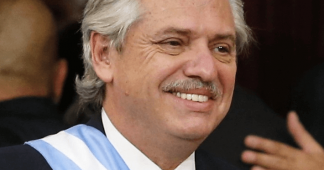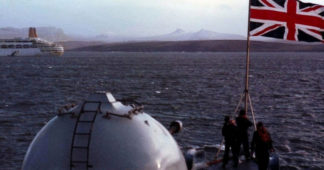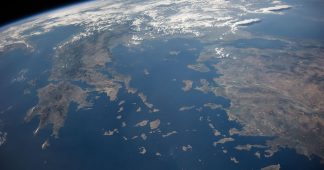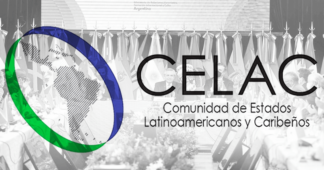As an event gets bigger, it’s more likely that interesting things will happen behind the scenes, that is, in unplanned activities.
The seventh meeting of G20 foreign ministers in India in 2023 confirms this. Bilateral meetings between Qing-Jaishankar, the Blinken-Lavrov dispute, and the meeting between Santiago Cafiero and James Cleverly, during which the former notified the latter of the end of the Foradori-Duncan agreement.
On March 2, 2023, by rescinding the Foradori-Duncan agreement, the Argentine government de facto reopened one of the most important territorial disputes in the Western Hemisphere, perhaps the most important, and did so in the most theatrical way possible: at the G20, the main North-South dialogue platform.
What was the purpose of the Foradori-Duncan agreement?
The idea behind the agreement was for the Argentine government to renounce its claims and any serious discussion regarding the territorial dispute over the sovereignty of the Malvinas (Falklands) Islands and the adjacent territories in the South Atlantic. Instead, the Argentine government would adopt a position of claiming “light sovereignty” in order to obtain benefits, mainly economic ones, through joint exploitation of the natural resources of the islands and adjacent territories in the South Atlantic with the United Kingdom (UK), as well as through British investments in the country.
In practice, this agreement implied the Argentine government’s resignation to discuss sovereign rights over the Falkland Islands and their adjacent territories in the South Atlantic. It can be inferred that this was a disguised surrender clause by the government of Mauricio Macri to continue with Argentina’s sovereign claim over the Malvinas Islands.
The purpose of the Foradori-Duncan agreement was in line with the foreign policy stance of the Macri administration (2015-2019), which had a marked pro-Western (and more Atlanticist) position than previous governments (Kirchnerism 2003-2015).
This geopolitical code (if we can speak of the existence of a “Macrista geopolitical code” coming from the geopolitical code of the traditional Argentine ruling class) consisted of a series of agreements (tacit and official) of Argentine resignation and subordination to traditional Western powers (of which the Foradori-Duncan agreement was one of its greatest exponents) which aimed –in theory– to obtain greater economic benefits and a renewal of the country’s public image in the supposed “international community.”
These types of foreign policy positions would be a constant of the Macri government. Even the Argentine scholar Juan Gabriel Tokatlian has conceptualized such a stance as “Concessive Peripheral Unilateralism” to define the foreign policy of the Macri government [1].
In practice, these ideas and plans, were shown to be totally ineffective and unproductive. Argentina practically did not receive economic benefits from such positions, nor did its public image have a significant and positive international projection. And the Foradori-Duncan agreement is the most scandalous example of this reality.
Why did the Argentine government of Alberto Fernández decide to end such an agreement?
The first explanation is the internal conformation and political identity of the government of Alberto Fernández, which logically demanded a change in the previous government’s (Macri) stance on the Malvinas agreements, his predecessor and opponent. But this inference raises another question: Why were such measures not taken before? The answers to this question are only conjectures.
Since the end of the Malvinas War (1982) until today, except for the years of the Menem governments (1989-1999), Argentina’s bilateral relationship with Great Britain has always been marked by a strong “Malvinense” [2] component on the agenda of their interaction, which has often led to high-pitched disputes between both parties. The “agenda” of the Malvinas cause was a constant trend of the Kirchnerist governments (2003-2015), such claims were made, denouncing British illegal occupation of the Falkland Islands on numerous occasions in various international forums, bilateral meetings, and multilateral forums.
But as mentioned earlier, the Macri government would have a diametrically opposed position to its Kirchnerist predecessors regarding the Malvinas question. However, the reality of the country and its foreign policy changed again when Argentina “presented” a new government in 2019, with Alberto Fernández as the head of the presidency.
The government of A. Fernández has an eclectic political character [3], as a result of a coalition between several political sectors, so the foreign policy of his government also reflects the heterogeneous internal conformation of the government coalition sectors.
In such conformation, sectors such as Kirchnerism, as well as more orthodox Peronist sectors, are present, both of which have traditionally had a more “Post-Western” stance, aiming to “rewrite the Argentine geopolitical code” and the vectors of Argentine foreign policy, projecting an alternative foreign policy, in first place towards their own region: South America, Ibero-America, the Caribbean, and in more modern times, especially towards the Global South, the BRICS, and Asia. In such guidelines, the action of rescinding the Foradori-Duncan agreement was logical. But logic also makes us wonder, why were such measures not taken before? Such questions enter the realm of speculation.
Another analysis could be given in an electoral key reading, this year 2023, presidential elections will be held in Argentina, and Alberto Fernández has expressed on several occasions through words and gestures [4], that he is willing and interested in being re-elected as the head of the Argentine executive branch.
Facing a public image tarnished by the covid-19 pandemic, and mainly a negative macroeconomic situation, the electoral nature of this foreign policy measure cannot be ruled out: the Malvinas cause is a cause that mobilizes emotions in Argentine society and remains a deep wound to national pride, and is a valid rhetorical and practical tool to antagonize the Argentine opposition (liberals and conservatives), which has never had (and perhaps never will have) a firm geopolitical stance nor interest in the Malvinas question.
Also, the reading of tensions within the coalition of the current Argentine government can’t be ruled out, in this last aspect, this measure could be read as a gesture of balance from the “Albertismo” towards Kirchnerism, a sector of the government in which many leaders believe that the sector identified with the president has geopolitically leaned too much towards Washington and the West since the 2022 debt agreement with the IMF and the war in Ukraine.
Argentina informed the British of its decision during the G20 foreign ministers’ summit, which was dominated by the BRICS. Is it a coincidence that such a measure was taken at one of the most representative events of the Global South?it clearly cannot be considered a coincidence.
The symbolic weight of such an action, in such a context, must be clearly considered. The G20 has a dual character as the main forum in which traditional (Western) powers dialogue but also reflects their tensions and antagonisms with emerging powers and peoples, including those of the so-called Global South.
With tensions between former metropolis countries and former colonies that make up the G20, and which are now emerging in material capabilities, a post-colonial and decolonial reading cannot be ruled out, and therefore a strong message from Argentina to the world’s emerging powers and the Global South.
Did China have any influence on the finalization of the pact?
No, there is no such “Chinese hand” that has driven such a measure by the Argentine government. These are paranoid arguments with a stubborn anti-Chinese bias that also ignores Argentina’s own reality. To put it plainly, if we use common sense, the decision was not elaborated nor driven from Beijing.
As mentioned earlier, the issue of the Malvinas is a deeply rooted national cause in Argentine society, and a constant in the foreign policy of Kirchnerism, which today is part of the coalition that compose the current Argentine government, which with such measures such as revoking the Foradori-Duncan agreement seeks to “retake the ownership of the Malvinas and South Atlantic issue in its agenda,” marking a clear differentiated stance from the current political opposition (Juntos por el Cambio) that made such a pact in the previous presidential term.
The decision was not elaborated nor driven by Beijing, and in any case, recent and clear positions of support for Argentina’s sovereign claim in the Malvinas Islands by powers such as China [5] and Russia [6] were considered within the decision-making process to take such measures. Therefore, the positions of Beijing and Moscow influenced, but did not condition or generate, Buenos Aires’ decision.
The future of the Malvinas Question
It’s very difficult to envision a future scenario for such a specific and complex issue, especially in the long term. But a prospective scenario can be envisioned in the short term, which is basically and probably that the situation will not change significantly under current conditions. Unless the world is altered by seismic events.
It’s highly unlikely that we will see a dialoguing UK government in the short and medium term that is willing to negotiate the sovereignty of the Falkland Islands. And it is similarly unlikely to see a future Argentine government, especially if it has the characteristics of a Peronist, Kirchnerist, or progressive government, openly giving up its claims to the sovereignty of the Falkland Islands.
Such a proposition would surely change if there were a liberal-oriented government in Argentina, such as Mauricio Macri’s.
The problem with the current Argentine government, as well as future ones, regarding the Malvinas dispute, is that the country does not have, and will not have in the short and medium term, the set of soft and hard capabilities (economic, diplomatic, military, ideological influence) to press and force the UK hard enough to revise its traditional stance on the occupation of the islands. At least until the current balance of power and the position of emerging powers, such as China, would consolidate even further in the world order.
But in any case, such changes and opportunities will depend on the international context and the agency of third parties, which are independent variables for the positions that future Argentine governments may take.
Most experts in international relations and geopolitics agree that the territorial dispute over the Falkland-Malvinas Islands between Britain and Argentina will not have an easy or predictable resolution in the short term.
Some experts point out that the strategic geographical position of the Malvinas Islands and the presence of significant natural resources in the area, such as fishing and hydrocarbons, make the dispute even more complicated.
Moreover, many experts believe that Britain’s position has been strengthened in recent years thanks to the exploitation of the area’s natural resources and the lack of a clear strategy on the part of Argentina to resolve the dispute.
A hypothetical Chinese presence in the region, through the southern Argentine city of Ushuaia, through the construction of a logistics hub, has added an intervening element that makes it even more complex to envision a prospective scenario [7].
However, some experts believe that the issue of the territorial dispute over the Falkland Islands, Argentina’s position is legitimate, which has won it great support and sympathy among peoples and emerging powers, most of them with a colonial past [8].
References
[1] Tokatlian, J. G. (2018, 2 de febrero). Relaciones con EEUU: ¿nueva etapa? (Relations with the US: a new phase?) Clarín.
https://www.clarin.com/opinion/relaciones-ee-uu-nueva-etapa_0_rka7ze-UM.html
[2] Porto, J. M. (26/03/2022). Despite diplomatic ups and downs, the Malvinas claim became a state policy. Telam. https://www.telam.com.ar/notas/202203/587606-diplomacia-soberania-argentina-islas-malvinas.html
[3] In its composition as a coalition, including important elements of what might be called “Centre-Right” sectors that have Western – especially Washington – affinities.
[4] Its relevant to remember that on 22 February Alberto Fernandez led a public act in situ celebrating 119 years of Argentine presence in Antarctica. “Alberto Fernández visits Antarctica“. Sputnik. (23/02/2023). https://sputniknews.lat/20230223/alberto-fernandez-visita-la-antartida-1136141105.html
[5] Joint Statement between the Argentine Republic and the People’s Republic of China on Deepening the Argentina-China Comprehensive Strategic Partnership. (06/02/2023). https://cancilleria.gob.ar/es/actualidad/noticias/declaracion-conjunta-entre-la-republica-argentina-y-la-republica-popular-china
China’s support for the Malvinas deepens a relationship with many agreements. Telam. (03/07/2021). https://www.telam.com.ar/notas/202107/560027-apoyo-china-malvinas-cada-vez-mas-explicito-profundiza-relacion-muchos-acuerdos.html
[6] United Russia leader Medvedev celebrates Argentina’s termination of Foradori-Duncan agreement. Sputnik. (2023, March 6). https://sputniknews.lat/20230306/el-lider-de-rusia-unida-celebra-que-argentina-haya-terminado-el-acuerdo-foradori-duncan-1136503626.html
Putin defended Argentina’s sovereignty over Malvinas and took aim at Boris Johnson and Margaret Thatcher. Política Argentina. (2022, May 30). https://www.politicargentina.com/notas/202206/44954-putin-defendio-la-soberania-argentina-sobre-malvinas-y-le-tiro-a-boris-johnson-con-margaret-thatcher.html
[7] The details of the Ushuaia Logistics Hub to supply Antarctica. El Cronista. (24/12/2021).
https://www.cronista.com/economia-politica/exclusivo-los-detalles-del-polo-logistico-de-ushuaia-para-abastecer-a-la-antartida/
An Antarctic logistics hub: official plan opens the door to strategic partners. El Cronista. (11/10/2021).
https://www.cronista.com/economia-politica/un-polo-logistico-para-la-antartida-el-plan-oficial-que-abre-la-puerta-a-socios-estrategicos/
[8] The Group of 77+China gave strong backing to Argentina’s position on the Malvinas Islands question. Telam. (2022, November 12). https://www.telam.com.ar/notas/202011/534875-el-g77china-dio-un-fuerte-respaldo-a-la-posicion-argentina-en-la-cuestion-malvinas.html
Recommended links
Argentine Foreign Ministry: “Malvinas – sovereignty: Cafiero met with his British counterpart and proposes to restart discussion on sovereignty at the UN, after notifying him of the end of the 2016 joint statement “.
Argentine Foreign Ministry: ” The G77 + China strongly supported Argentina on the Malvinas question and its sovereignty over natural resources”.
Sputnik: “The Malvinas War: the beginning of the rift between Latin America and the USA”
We remind our readers that publication of articles on our site does not mean that we agree with what is written. Our policy is to publish anything which we consider of interest, so as to assist our readers in forming their opinions. Sometimes we even publish articles with which we totally disagree, since we believe it is important for our readers to be informed on as wide a spectrum of views as possible.











